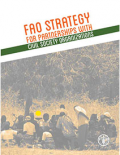Documents

Civil Society
18 Jul 2013
Abstract:
FAO has been working for many years with hundreds of civil society organizations (NGOs, community-based organizations, professional associations, networks, etc.) in technical work, emergency field operations, training and capacity building, and advocacy of best agricultural practices. Over the past years, civil society organizations (CSOs) have evolved in terms of coordination, structure, outreach, mobilization and advocacy capacity. In this period, FAO has also undergone changes in management, revised its Strategic Framework and given a new impetus to...
Cooperatives
16 Oct 2012
Accumulated research and experience show that while small farmers acting alone did not benefit from higher food prices, those acting collectively in strong producer organizations and cooperatives were better able to take advantage of market opportunities and mitigate the negative effects of food and other crises.
Cooperatives
16 Oct 2012
Cooperatives play a crucial role in reducing poverty, improving food security and generating employment opportunities. Awareness must be raised on their important contribution to global socio-economic development and to promote the growth and strengthening of cooperatives all over the world.
Cooperatives
16 Oct 2012
More than a billion of the world’s poorest people rely on forests and trees on farms to provide food, energy and cash income. By forming producer groups and cooperatives, forest farmers can take collective action and enjoy economies of scale.
Cooperatives
16 Oct 2012
Agricultural cooperatives (AC) have proved to be an effective mechanism for engaging young people in agriculture while increasing youth employment opportunities through on-farm and off-/non-farm activities. As highlighted by the 2011 International Day of Cooperatives with its theme of “Youth, future of cooperative enterprise”, equitable and efficient ACs can play an important role in helping young farmers overcome specific challenges to engage in agriculture.
